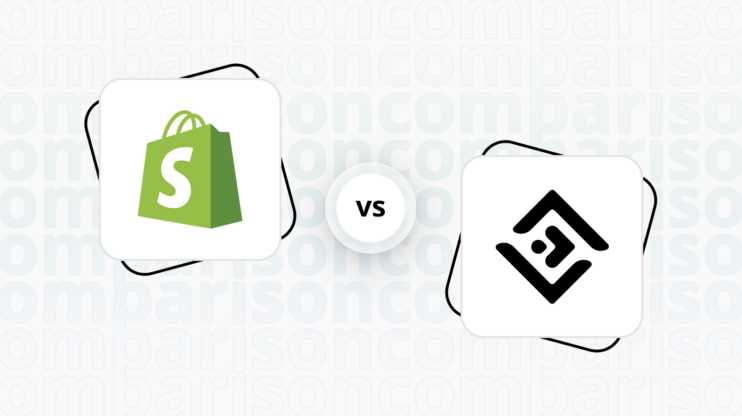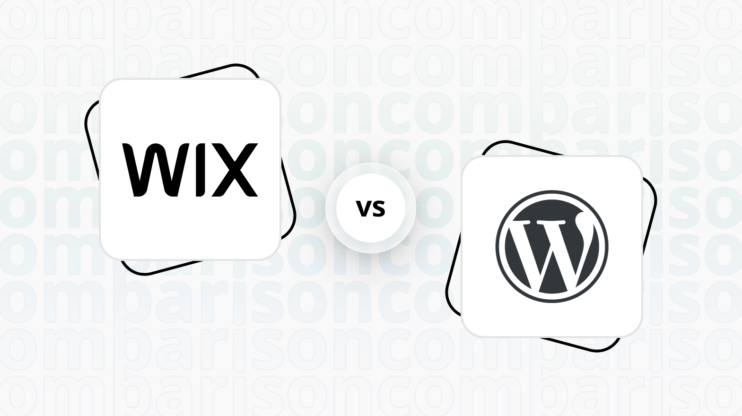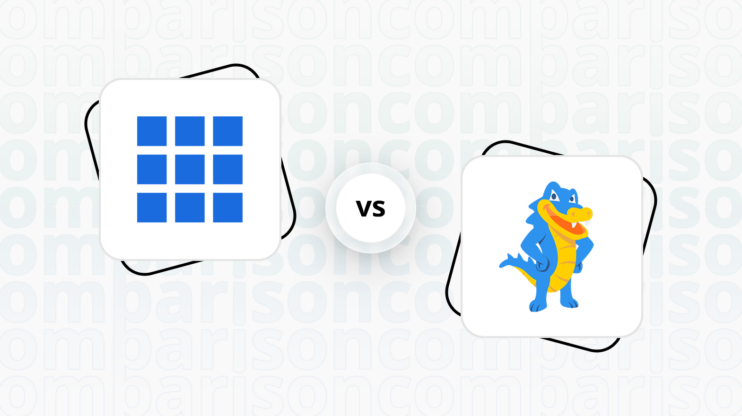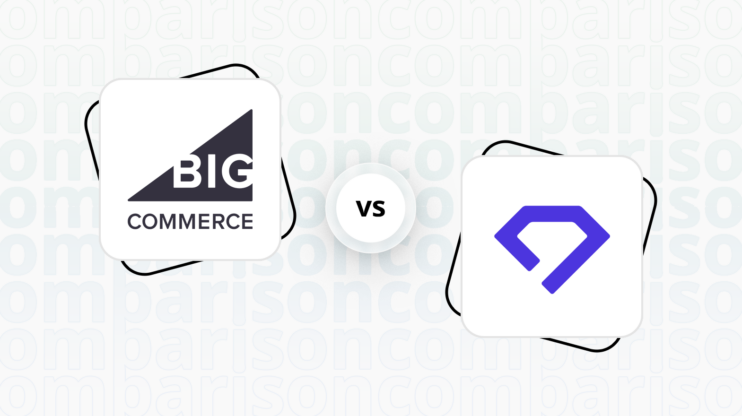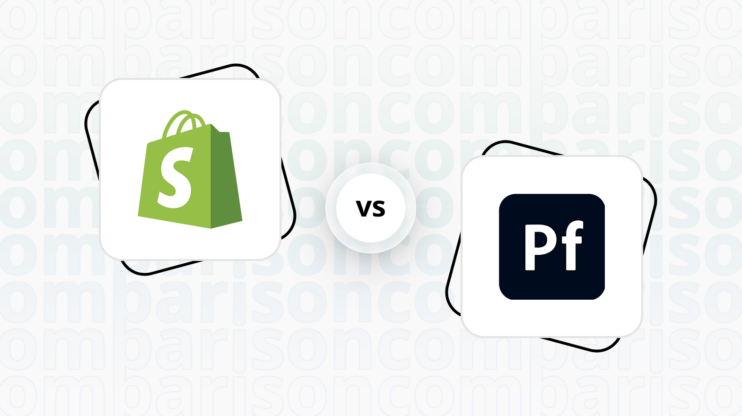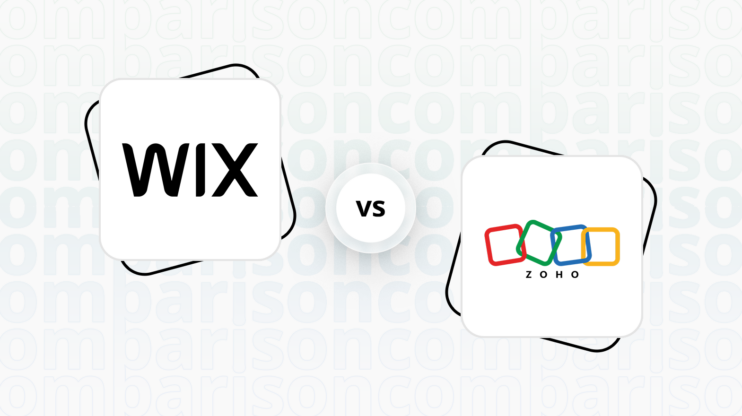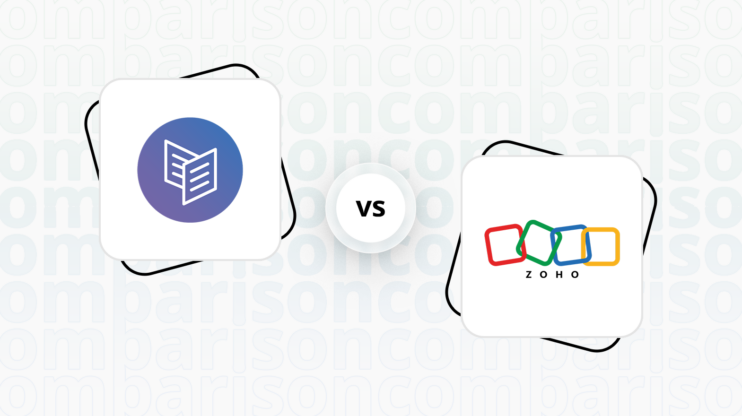Final verdict
Between Shopify and Yola, Shopify emerges as the superior platform for users seeking a robust ecommerce solution, while Yola is praised for its ease of use and user management.
-
Shopify (Overall Grade: 8.1/10)
excels in providing a comprehensive ecommerce platform with advanced features for online stores, including a wide range of templates, extensive ecommerce capabilities, superior website editors, and robust hosting quality. Its focus on security, marketing features, and AI capabilities further enhances its appeal to businesses looking to scale. Shopify’s strong customer support and positive user feedback underscore its effectiveness as a dedicated ecommerce solution. -
Yola (Overall Grade: 6.5/10)
, while scoring lower overall, stands out for its user-friendly interface and ease of use, making it a good choice for individuals and small businesses looking for a straightforward website building experience. Yola’s strengths in user management and the provision of basic ecommerce capabilities through integrations make it a viable option for those with simpler online store needs. However, it falls short in areas critical to ecommerce success, such as advanced features, marketing tools, and AI capabilities.

|

|
|
|---|---|---|
| Design Functionalities & Templates |
8.2 |
7.2 |
| Ease of Use |
7.5 |
8.0 |
| Ecommerce |
9.2 |
5.7 |
| Website Editors |
7.9 |
6.7 |
| Product Testing Options |
8.1 |
7.5 |
| Price |
8.2 |
8.1 |
| Hosting Quality |
9.0 |
7.2 |
| Website Speed Optimization |
7.8 |
7.5 |
| Plugins and Integrations |
8.7 |
6.3 |
| Marketing Features |
8.8 |
6.5 |
| Customer Support |
8.6 |
6.3 |
| Security |
9.0 |
8.3 |
| AI Capabilities |
7.9 |
0.0 |
| User Management |
6.5 |
7.3 |
Best for ecommerce
 9.2
9.2
 5.7
5.7
Verdict
: Shopify outshines Yola with its robust ecommerce capabilities, making it the superior choice for businesses aiming for growth and scalability.
-
Shopify
: Dominates the ecommerce space with a score of 9.2, offering an extensive array of features designed for online stores of all sizes. Its platform is tailored for growth, supporting everything from product management to global payments. -
Yola
: With a score of 5.7, Yola provides basic ecommerce functionalities suitable for smaller operations. It’s a good starting point for those new to online selling but lacks the scalability and advanced features found in Shopify.
Best for informational & business websites
 6.8
6.8
 7.4
7.4
Verdict
: Yola edges out Shopify for informational and business websites, offering a more user-friendly platform with a slightly higher score in this category.
-
Shopify
: Shopify, primarily an ecommerce platform, offers robust features for online stores but may not be the first choice for purely informational or business websites. Its score of 6.8 reflects its focus on ecommerce rather than informational content. -
Yola
: With a score of 7.4, Yola is better suited for informational and business websites. It provides a user-friendly interface and a variety of responsive and customizable templates, making it easier for users to create professional-looking websites without needing advanced technical skills.
Detailed comparison
Design functionalities & templates
Design FunctionalitiesRepresents how well each platform allows for creative design and customization of websites.Score Components:
- Template Variety (30%): Range and quality of design templates.
- Customization (30%): Flexibility and options for design alterations.
- User Interface (20%): Ease and intuitiveness of the design process.
- Responsiveness (10%): Adaptability to different devices and screen sizes.
- Innovation (10%): Unique design features and tools.
 8.2
8.2
 7.2
7.2
🏆
Winner: Shopify.
If you’re looking for a platform that offers more professional and ecommerce-focused design functionalities and templates, Shopify is the preferred choice.
Shopify’s templates are sleek and professional, ideal for ecommerce sites. They offer a sophisticated look with a focus on online stores. While the free template selection is not large, Shopify’s premium theme store provides a variety of industry-specific options, offering advanced features for a strong brand presence.
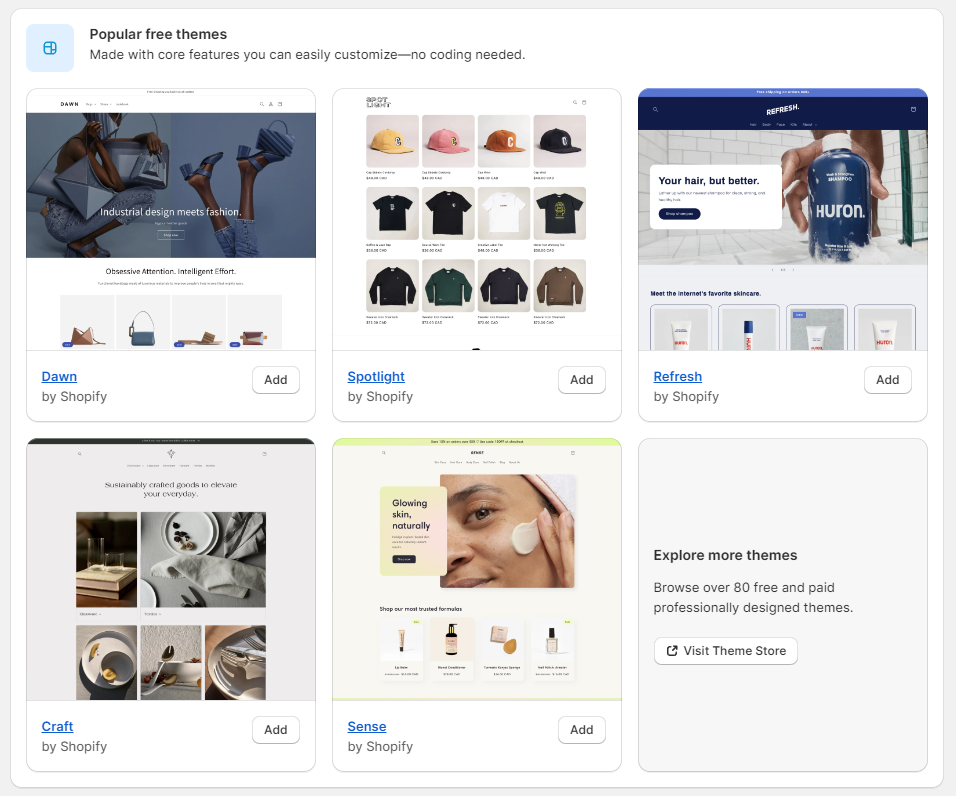
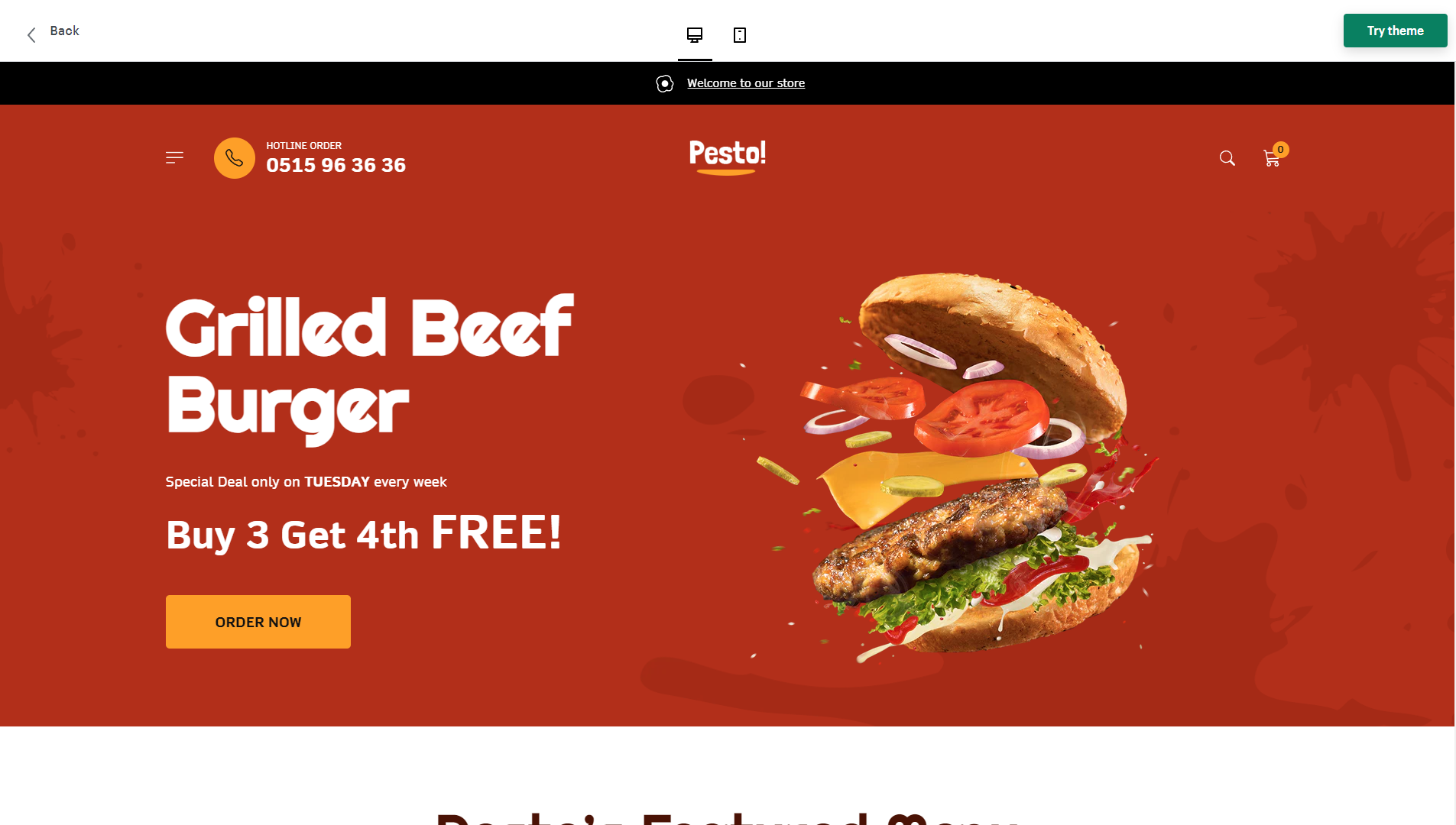
On the other hand, Yola offers a diverse range of templates and designs, catering to various types of websites, from personal blogs to professional business sites. Users can choose from a wide selection of themes, each customizable to fit their specific needs and preferences. With hundreds of templates available, Yola ensures that there is something for everyone, regardless of their niche or industry.


Get a head start on website creation with AI
Create a custom website tailored to your business needs 10X faster with 10Web AI Website Builder!
Ease of use
Ease of useReflects the platform’s overall user-friendliness.Score
Components:
- Learning curve (40%): Quickness and ease of getting started.
- Interface design (30%): Simplicity and intuitiveness of layout.
- User guidance (20%): Quality of tutorials and support.
- Flexibility (10%): Adaptability to various user skills.
 7.5
7.5
 8.0
8.0
🏆 Winner: Yola
. Scoring a solid 8.0, Yola stands out for its user-friendly interface, making it exceptionally easy for beginners to create and manage their websites. Shopify, with a score of 7.5, offers a robust platform but with a steeper learning curve, especially for those new to ecommerce. If ease of use is a priority, Yola is the clear winner in this category.
Learning Resources
🏆 Winner: Shopify
. While both platforms offer solid learning resources, Shopify goes a step further with its wide array of detailed tutorials and active community forums, making it easier for users to learn and adapt.
For ecommerce
EcommerceMeasures the platform’s effectiveness in supporting online business activities.Score Components:
- Ecommerce themes and templates (20%): Variety and design of templates.
- Product management (25%): Ease of managing and organizing products.
- Payment options (25%): Variety and convenience of payment methods.
- Ecommerce features (20%): Features for managing an ecommerce store.
- Integration (10%): Compatibility with external e-commerce tools and services.
 9.2
9.2
 5.7
5.7
Shopify, with a score of 9.2, is a leading ecommerce platform that provides a comprehensive set of features for online businesses. It offers tools for creating and customizing online stores, managing products, processing payments, and handling order fulfillment. On the other hand, Yola, scoring 5.7, provides an easy-to-use, drag-and-drop website builder with ecommerce capabilities through an integration with Ecwid. However, its ecommerce features may be limited by the lack of tiered options for scalability and a conventional CMS dashboard, as well as the absence of a marketplace for extensions and plugins.

|

|
|
|---|---|---|
|
Ecommerce themes and templates |
8.2 |
5.5 |
|
Product page customization |
8.5 |
6.8 |
|
Payment processing and commissions |
8.8 |
7.0 |
|
POS capabilities |
8.1 |
4.5 |
|
Payment gateways |
9.5 |
7.5 |
|
Product numbers |
9.0 |
7.0 |
|
Additional ecommerce features |
9.1 |
6.0 |
Shopify ecommerce features:
- Comprehensive store builder
- Shopify Payments and other gateways
- Advanced inventory management
- Multi-channel selling
- Abandoned cart recovery
- Detailed analytics and reporting
Yola ecommerce features:
- Shipping and Tax configurations
- Product Catalog Management
- Ability to checkout as guest
- Analytics and reporting
- Promotions features
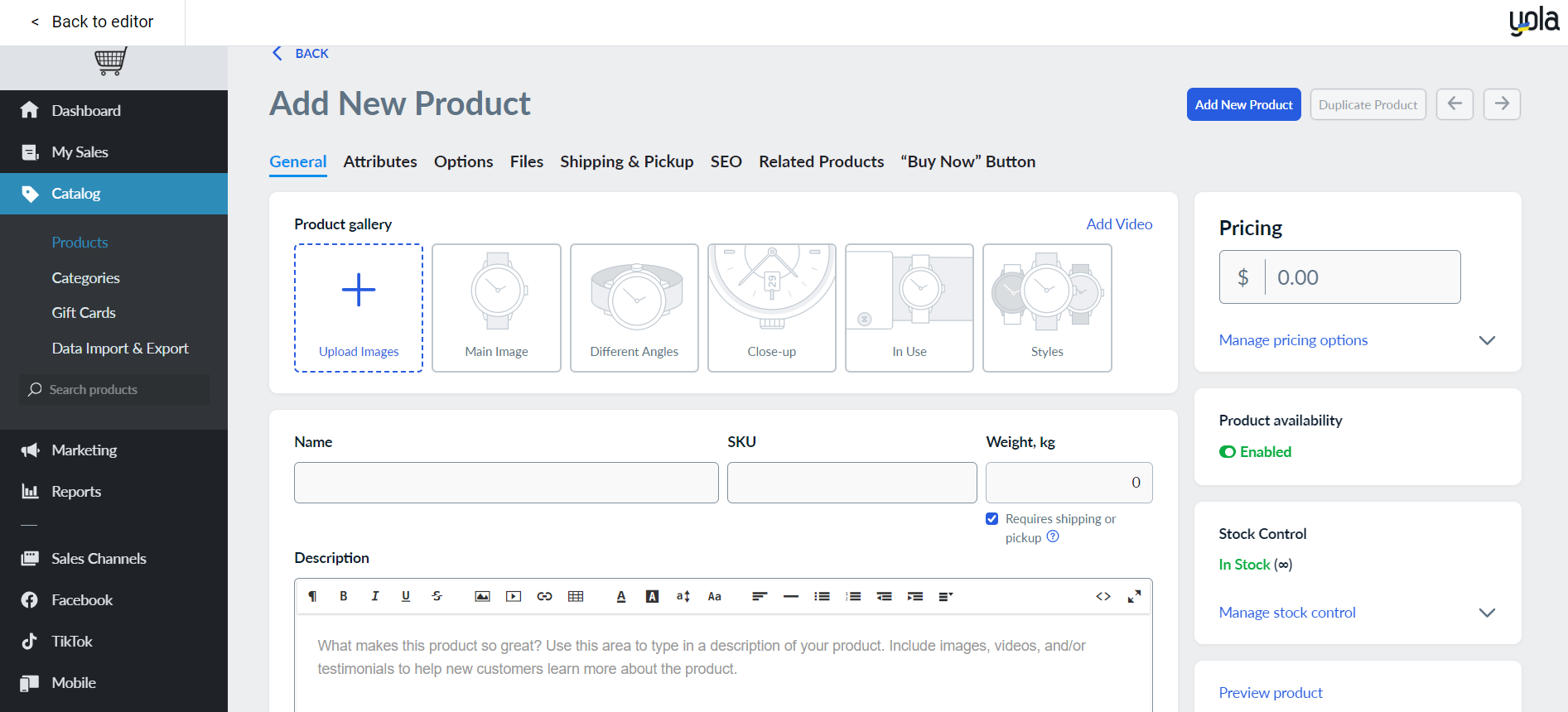
Ecommerce themes & templates
Shopify offers about 150 modern responsive themes for creating a virtual storefront, ensuring a good look on both desktop and mobile devices. While some themes are free, others cost between $170 to $380. In contrast, Yola offers a range of templates for building websites, including those suitable for ecommerce, but the variety and design quality may not match those provided by other leading website builders. The templates are customizable, especially for users on higher-tier plans (Silver or Gold), which allow for deeper customization, including CSS editing.
Product page customization
Shopify has a limit of three options per product, totaling 100 unique variations. This limit may not pose a significant constraint, and it is suggested that for products with numerous options, creating separate listings on Shopify can be a more manageable approach. On the other hand, Yola’s eCommerce platform offers a variety of customization options for your product pages, including the ability to manage product options and combinations. This feature is especially useful for selling items that come in different sizes, colors, or models, allowing customers to select their preferences directly from the product page.
Payment processing
When it comes to payment processing, Shopify offers payments with typical charges of
2.9% + 30¢
per online transaction on basic plans, and lower fees for higher-tier plans. However, it adds extra fees for using other payment gateways. On the other hand, Yola supports various payment gateways for online store transactions, such as PayPal, Sage Payments, and American Express, allowing users to choose based on their specific needs, including geographical availability and fee structure. While Yola doesn’t directly charge commission fees for transactions, the chosen payment gateway might impose its own fees, including transaction and possibly monthly fees.
In conclusion, Shopify appears to be a more robust and comprehensive ecommerce solution compared to Yola, offering a wider range of features and capabilities for online businesses. However, Yola might be a suitable choice for individuals and small businesses looking for a user-friendly website builder with basic ecommerce capabilities.
Website Editors
Website EditorsEvaluates the platforms’ website building and editing capabilities.Score Components:
- Customization tools (40%): Range and power of editing features.
- Editor usability (30%): User experience within the editor.
- Design flexibility (20%): Freedom in layout and design changes.
- Update and maintenance ease (10%): Simplicity of updating and maintaining the site.
 7.9
7.9
 6.7
6.7
🏆
Winner: Shopify
. Shopify, with a score of 7.9, excels in providing a streamlined, ecommerce-focused editing experience. It’s particularly beneficial for users who prioritize efficient management of online stores. The editor is straightforward, making it easy to add products, manage inventory, and set up payment methods. Shopify’s editor is optimized for sales and business growth, with built-in tools specifically designed for ecommerce businesses.
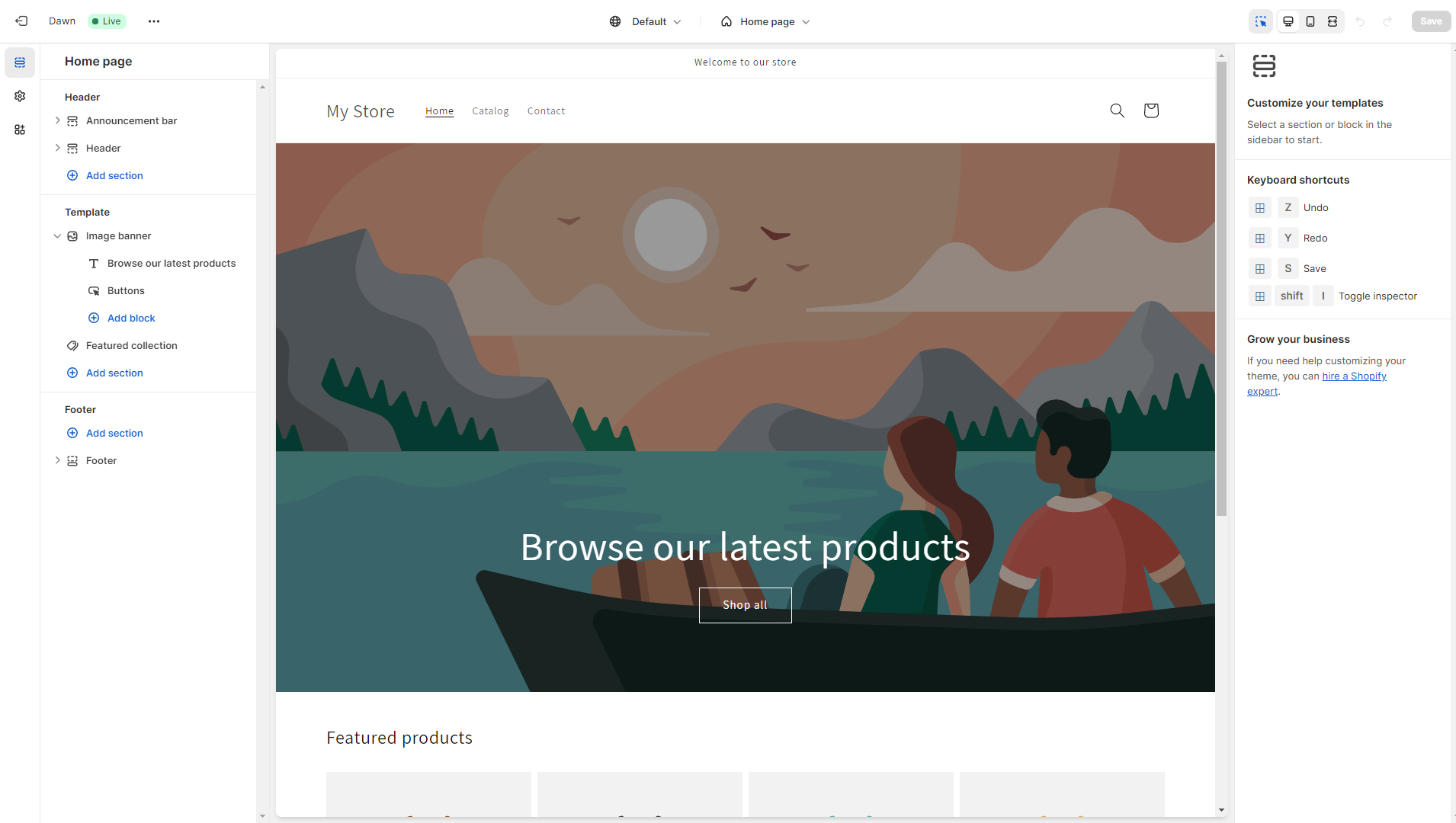
Yola’s editor, scoring 6.7, is designed for ease of use, allowing users to create professional-looking websites without needing coding knowledge. It offers a drag-and-drop interface, enabling users to easily add, customize, and position elements like text, images, and buttons on their web pages. However, some users might find the customization options somewhat limited compared to more advanced platforms.
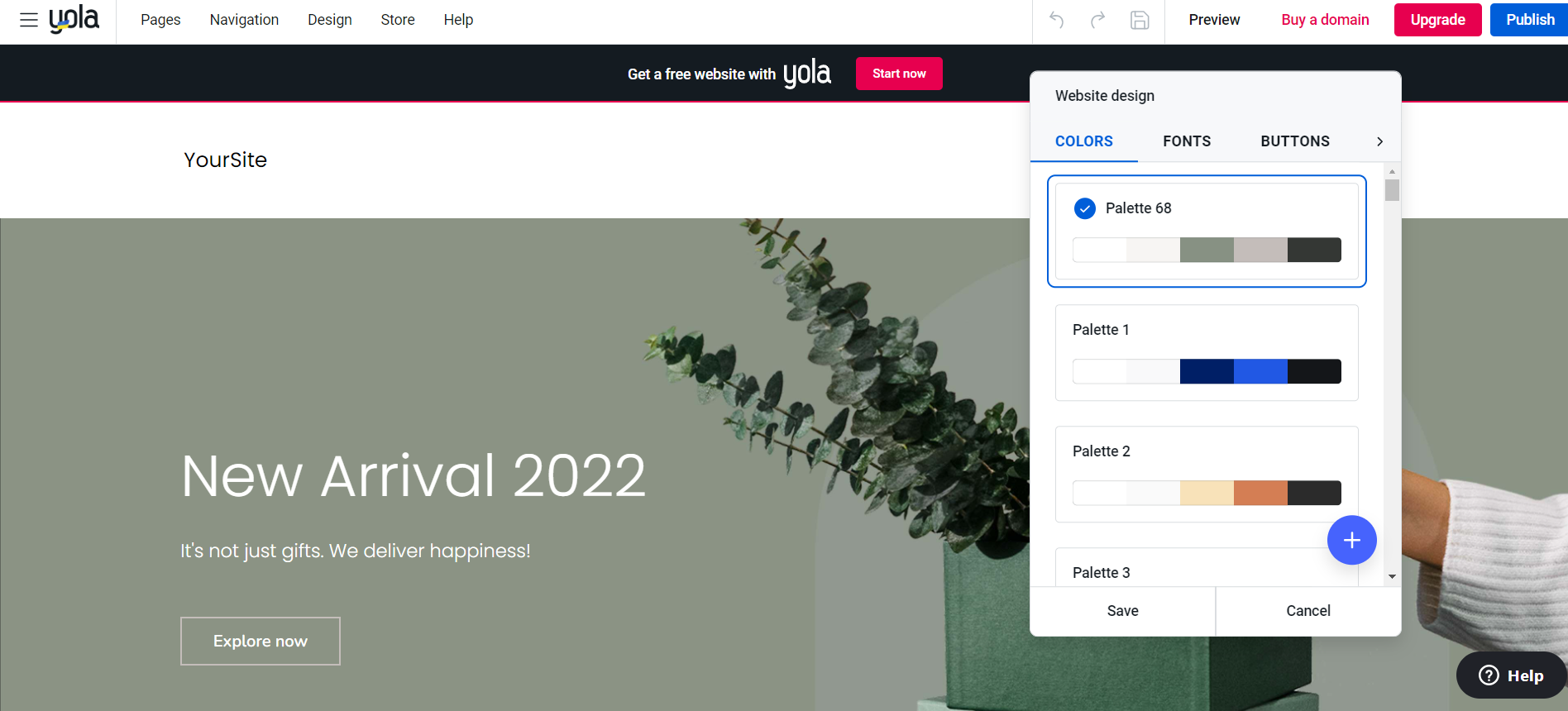
Mobile editor/app
 8.0
8.0
 4.5
4.5
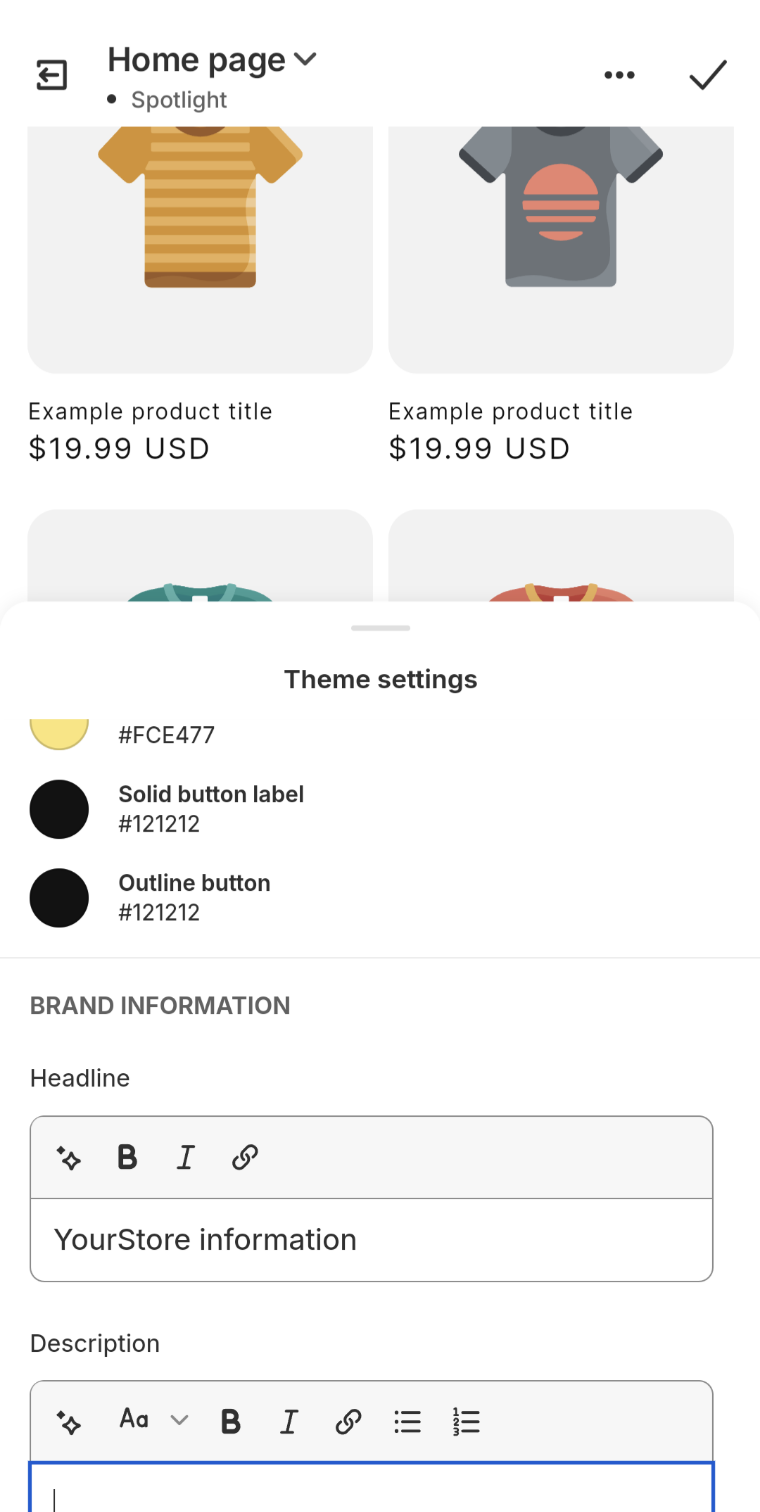
🏆
Winner: Shopify
. Both Shopify and Yola offer mobile capabilities, but they differ significantly in their offerings. Shopify provides a user-friendly mobile theme editor that allows users to customize their online store directly from their mobile device. This feature enables the addition, removal, editing, and rearrangement of content on the store’s website, offering convenient on-the-go adjustments to the store’s appearance and layout.
On the other hand, Yola does not have a dedicated mobile editor app. It is possible to make some small changes using a mobile browser, but this is not as convenient or comprehensive as a dedicated app. Therefore, Shopify is the clear winner in this category due to its superior mobile editor capabilities.
Product testing options
Product Testing OptionsAssesses the options for trying out platform features before commitment.Score Components:
- Trial quality (40%): Extent and usefulness of the trial or free version.
- Feature accessibility (30%): How many features are available to test.
- Trial duration (20%): Length of the trial period.
- Ease of transition (10%): Smoothness of moving from trial to paid plans.
 8.1
8.1
 7.5
7.5
Overall Result
:
Shopify wins
. Shopify scores 8.1, offering a 14-day free trial with access to all features, while Yola scores 7.5, offering a free version and the possibility to test premium features during the 30-day refundable period.

|

|
|
|---|---|---|
|
Free Plan |
No (14-day free trial) |
Yes |
|
Trial Duration |
14 days | No trial version |
|
Testing Premium Features |
All features during free trial |
During the 30-day refundable period |
Price
PriceLooks at the cost-effectiveness and value for money of each platform.Score Components:
- Plan value (40%): What each pricing tier offers.
- Transparency and clarity (30%): Clearness of pricing structures.
- Flexibility of plans (20%): Range of options to suit different budgets.
- Hidden costs (10%): Additional expenses not included in the plan.
 8.2
8.2
 8.1
8.1
Shopify and Yola have similar price scores, but Shopify offers more advanced features and better discounts on annual subscriptions.

|

|
|
|---|---|---|
|
Free |
No offering at this amount. |
Free (Website) ($0/month): Basic features with Yola subdomain, suitable for starting a simple site. With possibility to have up to 2 websites and 2 page limit. Free (Online Store Add-on) ($0/month): Launch an online store with basic features and a limited number of products. Available as an add-on to a website plan. |
|
$0-$10 |
No offering at this amount. |
Bronze (Website) ($9.45/month): More resources and features, including unlimited pages and bandwidth. With possibility to have up to 5 websites. Value for price: 7.5 |
|
$10-$15 |
No offering at this amount. |
Basic (Online Store Add-on) ($15.00/month): Includes inventory tracking, order management, and the ability to sell on Facebook. Available as an add-on to a website plan. Value for price: 7.0 |
|
$15-$20 |
No offering at this amount. |
Silver (Website) ($18.95/month): Advanced design features and site customization options. With possibility to have up to 25 websites. Value for price: 8.0 |
|
$20-$35 |
Shopify Basic ($29/month): Unlimited products, 2.9% + 30¢ card fee with Shopify payments, Extra 2% gateway fee without Shopify Payments, Abandoned cart recovery, Automated sales tax, Digital products, POS Integration, 2 staff accounts. Value for price: 8.0 |
Professional (Online Store Add-on) ($35.00/month): Advanced features including discount coupons, product filters, and sales on multiple platforms like Facebook and Instagram. Available as an add-on to a website plan. Value for price: 8.0 |
|
$35-$40 |
No offering at this amount. |
Gold (Website) ($35.45/month): Comprehensive plan with unlimited storage and advanced SEO tools. With possibility to have up to 25 websites. Value for price: 8.5 |
|
$70-$100 |
Shopify Standard ($79/month): Lower card fees (2.6% + 30¢), Gift cards, Professional reports, 5 staff accounts. Value for price: 8.5 |
Unlimited (Online Store Add-on) ($99.00/month): The most extensive plan offering a vast product catalog, point of sale integrations, and more, for expanding online business. Available as an add-on to a website plan. Value for Price: 9.0 |
|
$200+ |
Advanced Shopify ($299/month): Lowest card fees (2.49% + 30¢), Advanced report builder, Real-time carrier shipping, Up to 15 staff accounts Value for price: 8.8 |
No offering at this amount. |
location. As a result in rare cases the prices displayed here can differ from the ones you see on their
websites.
Hosting quality
Hosting
qualityExamines the reliability and performance of the hosting solutions.Score Components:
- Uptime (40%): Consistency and reliability of website availability.
- Speed (30%): Loading times and performance.
- Bandwidth and storage (20%): Sufficiency of resources provided.
- Data centers (10%): Quality and distribution of hosting infrastructure.
 9.0
9.0
 7.2
7.2
Winner: Shopify
. Shopify’s proprietary cloud-based hosting, with a 99.99% uptime guarantee and 5 global data centers, is designed to support high-traffic online stores. Yola, on the other hand, offers managed cloud hosting with a 99.9% uptime guarantee and data centers in the US and EU. While Yola’s hosting is suitable for individuals and small businesses, Shopify’s hosting is more robust and reliable, earning it a higher rating.

|

|
|
|---|---|---|
|
Do they offer hosting? |
Yes, included in all paid plans |
Yes, included in all paid plans, free plan with limited features |
|
Data Centers: |
5 globally: USA (Ashburn, Virginia; Santa Clara, California), Canada (Toronto, Ontario), Ireland (Dublin), and Singapore |
5 data centers located in US and EU |
|
Type of hosting: |
Proprietary cloud-based hosting |
Managed Cloud Hosting |
|
Uptime: |
99.99% |
99.9% |
|
Uptime Guarantee: |
Yes, 99.99% |
Yes, 99.9% |
Website Speed Optimization
Website Speed OptimizationEvaluates optimization of website loading timesScore Components:
- PageSpeed Score (30%): Google’s score indicating performance optimization.
- Loading Time (30%): The average time until a website is fully interactive.
- Mobile Optimization (15%): Optimization effectiveness for mobile devices.
- Resource Optimization (15%): Optimizing images, scripts, and other heavy resources.
- CDN Usage (10%): Use of CDN to enhance speed across geolocations.
 7.8
7.8
 7.5
7.5
🏆 Winner: Shopify
Both Shopify and Yola place a high priority on website performance and page speed, with Shopify focusing on app efficiency and theme optimization, and Yola emphasizing CDN, caching, code minification, server response time improvements, and image optimization. However, Shopify gets a slight edge when it comes to website speed optimization.

|

|
|
|---|---|---|
|
Focus |
App efficiency, Theme optimization |
CDN, Caching, Code Minifcation, Server response time improvements, Image optimization |
|
Performance Tools |
Google Lighthouse, PageSpeed Insights |
Google PageSpeed Insights Integration |
|
Key Strategies |
App efficiency, Theme optimization |
CDN, Caching, Code Minifcation, Server response time improvements, Image optimization |
|
Load Times |
Varies widely, dependent on optimization |
Varies widely, depending on the optimization, website complexity |
|
Page Speed Scores Range |
Scores vary; influenced by apps, images |
Varies widely, depending on the optimization, website complexity |
|
Core Web Vitals Improvement |
Emphasis on LCP, FID, CLS improvements |
Emphasis on LCP, FID, CLS improvements |
Shopify’s approach to enhancing site speed includes app optimization by removing unneeded app code, conditionally loading apps, avoiding immediate pop-up displays, and incorporating app functionality directly into themes. This approach leverages Shopify’s fast servers and CDN network to boost load speed. Shopify also suggests utilizing Google AMP for faster mobile page loads, although with some design compromises. Analysis of three Shopify sites showed a range of Shopify speed scores from 14 to 75, Google PSI scores from 8 to 80, and load times varying from 10.6 seconds to 2.3 seconds. Continuous maintenance and optimization are essential for keeping Shopify stores fast.
Yola, like Shopify, places a strong emphasis on website performance and page speed. Yola’s approach to enhancing site speed includes CDN, caching, code minification, server response time improvements, and image optimization. However, both load times and Page speed scores vary widely, depending on the optimization and website complexity. Yola also emphasizes on LCP, FID, CLS improvements for Core Web Vitals.
Get a head start on website creation with AI
Create a custom website tailored to your business needs 10X faster with 10Web AI Website Builder!
Plugins and integrations
Plugins and integrationsMeasures the range and effectiveness of additional plugins and integrations.Score Components:
- Variety of options (40%): Range of available add-ons.
- Integration smoothness (30%): Ease of integrating plugins into the site.
- Quality of plugins (20%): Functionality and reliability of the options.
- Custom integration capabilities (10%): Support for custom or third-party integrations.
 8.7
8.7
 6.3
6.3
🏆 Winner: Shopify.
With a score of 8.7, Shopify outperforms Yola, which scores 6.3. Shopify offers over 8,000 apps in its App Store, covering a wide range of functionalities. These apps come with various pricing options, including free, paid, freemium, and one-time payment models. Key Shopify integrations feature Oberlo for dropshipping, Klaviyo for email marketing, Yotpo for reviews, Printful for print-on-demand, Shopify POS for sales, Google Analytics for insights, Facebook Channel for social selling, ShipStation for shipping, QuickBooks for accounting, Privy for conversions, Smile.io for loyalty, SEO Manager, AfterShip for tracking, Spocket for products, and Gorgias for customer service, enhancing various ecommerce aspects.
On the other hand, Yola supports a variety of functionalities through plugins and apps, including social media integration, e-commerce tools, marketing and SEO enhancements, customer engagement features, and various utility widgets to improve user experience and compliance. With over 70 free apps and widgets available through Elfsight as well as some built in integrations through the website editor itself, Yola offers extensive options to enhance and customize websites, making it a flexible choice for users ranging from beginners to advanced e-commerce businesses. Yola’s website builder is enhanced by integrations like the sophisticated Ecwid e-commerce solution for selling digital and physical products, wide range of social media integrations, Google reviews and All-in-one reviews, also advanced SEO tools exclusive to its Gold plan for optimizing site visibility.
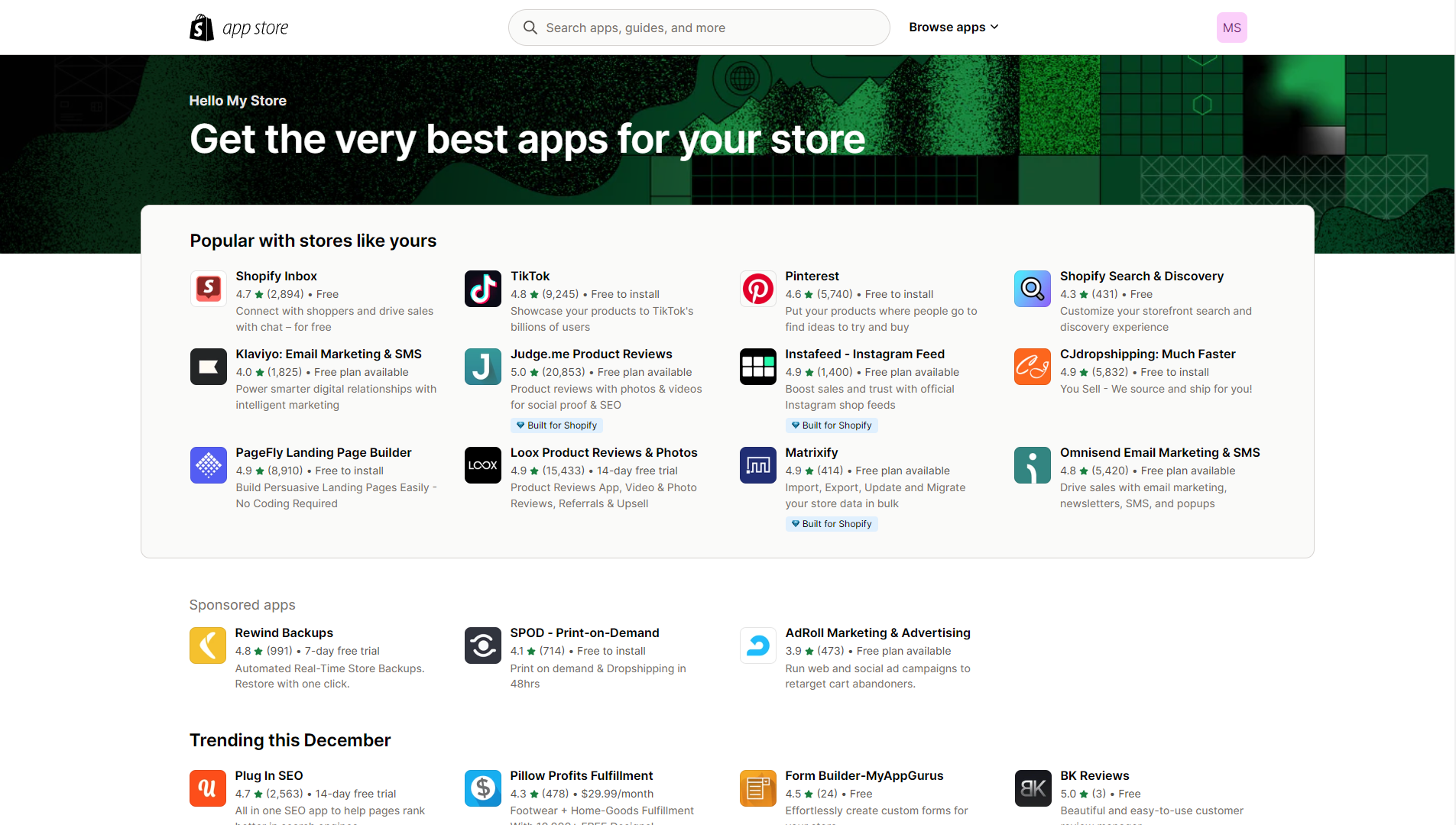
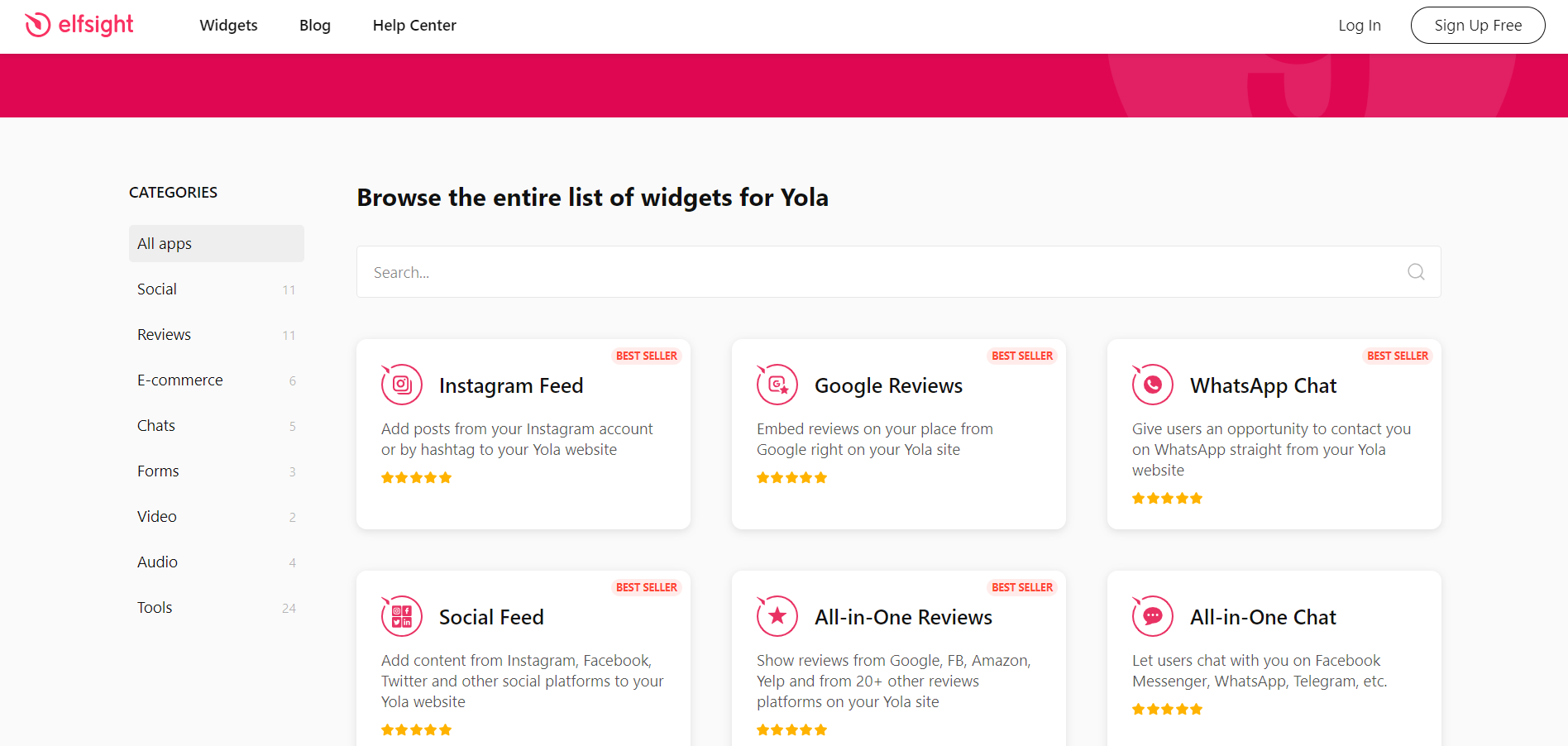
Marketing Features
Marketing featuresAssesses tools and options available for marketing.Score Components:
- SEO tools (40%): Effectiveness of SEO features.
- Marketing automation (30%): Availability and quality of marketing tools.
- Social Media integration (20%): Ease and depth of social media connectivity.
- Email marketing (10%): Quality and usability of email marketing tools.
 8.8
8.8
 6.5
6.5
🏆
Overall Winner: Shopify
. Shopify stands out for its more advanced ecommerce-focused marketing tools, especially in analytics and ad campaign management. Yola, while offering a range of marketing features, is more basic and limited in comparison.

|

|
|
|---|---|---|
|
SEO Tools |
|
(basic) |
|
Email Marketing |
|
(limited on lower plans) |
|
Blogging |
|
|
|
Social Media Integration |
Advanced integration for selling directly on social platforms |
|
|
Analytics and Reporting |
Detailed analytics for in-depth insights |
Basic analytics with Google Analytics integration |
|
Ads and Promotions |
Google Ads integration; sophisticated ad campaign management |
Available on higher plans |
Customer Support
Customer supportEvaluates the quality and availability of support options.Score Components:
- Response time (40%): Speed of support responses.
- Support quality (30%): Effectiveness and helpfulness of the support.
- Availability (20%): Range of support channels (phone, chat, email).
- Resource richness (10%): Quality of self-help and educational materials.
 8.6
8.6
 6.3
6.3
🏆 Winner: Shopify
. Shopify outperforms Yola in this category with a customer support score of 8.6 compared to Yola’s 6.3. Shopify provides 24/7 support through chat, email, and phone, and offers a wealth of resources including tutorials, forums, and a marketing blog.
Yola, on the other hand, offers 24/7 email support to all users, with priority support for Bronze, Silver, and Gold customers. However, it lacks the comprehensive support resources that Shopify provides. Furthermore, while Shopify offers a dedicated support program for enterprise-level businesses, Yola does not have an equivalent offering.
Security
SecurityLooks at the platforms’ security measures and data protection.Score Components:
- Data protection (40%): Safeguards for user and customer data.
- SSL and encryption (30%): Implementation of secure connections.
- Compliance (20%): Adherence to industry security standards.
- Regular updates (10%): Frequency of security updates and patches.
 9.0
9.0
 8.3
8.3
🏆
Winner: Shopify
. Shopify’s security measures are top-notch, with a focus on data privacy and security through secure infrastructure, encryption, and limited access. They comply with data privacy regulations, practice data minimization, and ensure user control and transparency. Additional security measures include two-factor authentication, regular audits, and a dedicated incident response team. Shopify also ensures website security with SSL certificates encrypting data, verifying website identity, and offering SEO benefits. Free SSL certificates are provided, with options for upgrades. The built-in Web Application Firewall filters and blocks threats, and users can add third-party firewalls for extra control and security.
Yola, on the other hand, also prioritizes the security of users’ private data through encryption, access controls, and compliance with data protection regulations like GDPR and CCPA. They conduct regular security audits, utilize secure data centers, and educate users on best practices for data protection. Yola employs robust security measures including SSL encryption, DDoS mitigation, firewalls, regular software updates, data backup, and recovery, as well as security audits and testing to safeguard users’ websites. These measures help protect against various threats such as data interception, denial-of-service attacks, unauthorized access, and system vulnerabilities. By prioritizing security at multiple levels, Yola aims to ensure the integrity and availability of its users’ websites, mitigating risks and enhancing overall trust and reliability in their platform. However, Shopify’s security measures and score are slightly superior, making it the winner in this category.
AI Capabilities
AI capabilitiesMeasures the effectiveness of AI-driven features and tools.Score Components:
- Automation efficiency (40%): Impact of AI on streamlining processes.
- Personalization (30%): AI-driven customization for users or customers.
- AI-Assisted design (20%): Role of AI in website design and functionality.
- Data analysis (10%): Use of AI in interpreting user data and analytics.
 7.9
7.9
 0.0
0.0

|

|
|
|---|---|---|
|
Personalized Design |
Shopify AI Builder offers personalized design suggestions |
|
|
SEO Optimization |
AI-driven recommendations for better search engine visibility |
|
|
Customer Behavior Analysis |
Advanced analytics to understand customer preferences |
|
|
Sales Predictions |
AI-powered sales forecasting tools |
|
|
Inventory Management |
AI tools to assist in efficient inventory handling |
|
|
Content Generation |
AI assistance in creating and optimizing site content |
|
🏆 Winner: Shopify
. Shopify, with a score of 7.9, utilizes AI mainly to enhance the ecommerce experience. Its AI features focus on customer behavior analysis, personalized shopping experiences, inventory management, and sales predictions.
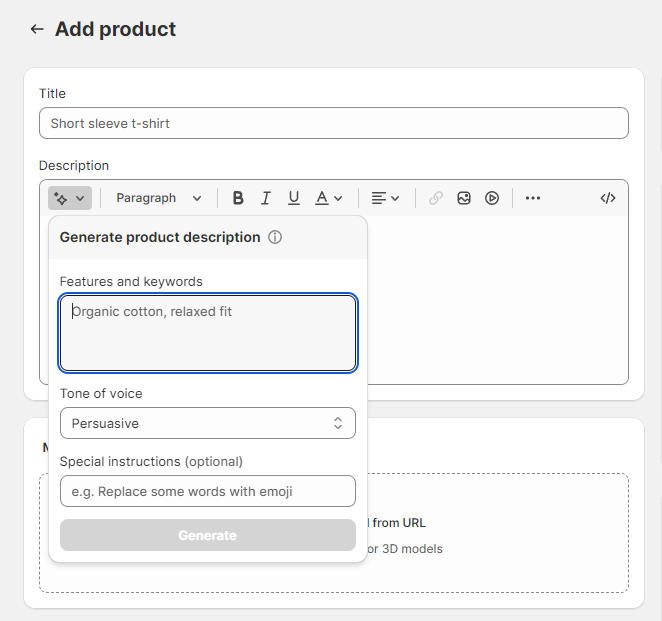
Yola, on the other hand, does not have any AI capabilities. This lack of AI features could limit the functionality and user experience of websites built with Yola.
User Management
User ManagementAssesses the platforms’ capabilities in managing user roles, permissions, and accessibility.Score Components:
- Role Customization (40%): Flexibility in creating and defining user roles and
permissions. - Ease of Management (30%): User interface and tools for managing users.
- Access Control (20%): Effectiveness of access control measures for different user
levels. - Scalability (10%): Ability to manage a growing number of users efficiently.
 6.5
6.5
 7.3
7.3
🏆 Winner: Yola
. Managing your online team with Shopify and Yola involves different approaches to website editing access.
-
Shopify enforces staff account limits based on plans, ranging from 2 to 15, with Shopify Plus offering unlimited
accounts. Collaborators with limited access are also an option. - Yola supports multi-user editing capabilities, allowing different levels of access and control based on the plan chosen. The primary account holder, often referred to as the Owner or Administrator, possesses comprehensive control over the website, including the ability to edit content, manage settings, and extend invitations to collaborators for website modification. Collaborators or Editors, invited by the account holder, can edit the website to varying degrees, which might range from content editing to page management, depending on the permissions granted by Yola’s platform. The number of users permitted to edit a website and the scope of their roles and permissions may vary, typically increasing with higher-tier subscription plans.
Shopify User Roles and Access Levels:
| Role | Description | Access Highlights |
|---|---|---|
| Store Owner | Full control over store | Manage products, orders, discounts, payments, apps, settings. Create and manage staff accounts. |
| Staff | Configurable access by owner |
Add/edit products, manage orders, fulfill orders, manage customers, update content. Access level can be customized by the owner. |
| Collaborator | Limited access for external partners | View and manage specific sections like blog or product categories. Cannot access full store settings. |
Yola does not provide a specific table for user roles and access levels. However, it offers flexible user management capabilities, allowing the primary account holder to extend invitations to collaborators for website modification and to grant them varying degrees of access and control.
Additional Features

|

|
|
|---|---|---|
|
SSL Certificate |
|
|
|
Custom Domain |
|
|
|
Free Custom Domain Included |
|
|
|
International Domains |
|
|
|
Mobile Responsive |
|
|
|
Page Speed |
|
|
|
Website Builder Mobile App |
|
|
|
Convert a Website To An App |
|
|
|
Website Analytics |
|
|
|
Multilingual Sites |
|
|
|
Multiple Users |
|
|
User Feedback
Shopify’s slightly higher rating on G2 Crowd can be largely attributed to its specialization in ecommerce. Its comprehensive features, ease of use, and robust customer support cater specifically to online businesses, leading to high user satisfaction among those seeking a dedicated ecommerce solution.
Yola, on the other hand, has received mostly positive reviews. Users appreciate its professional templates, ease of use, affordability, and customer service. They find it ideal for website creation, especially for those without specialized knowledge. However, some users express dissatisfaction with aspects such as data security, customization limitations, and lack of certain features like chat support. Overall, Yola appears to solve the problem of easy website creation and maintenance for businesses and individuals, offering a range of templates and tools at a reasonable price point.
The making of this blog
We followed a clear, step-by-step process to write and research this article.
FAQ
Which platform is better for ecommerce, Shopify or Yola?
Can I use Yola for creating an informational or business website?
How do Shopify and Yola compare in terms of design functionalities and templates?
Which platform is easier to use for beginners?
What are the main differences in website editors between Shopify and Yola?
How do Shopify and Yola fare in terms of hosting quality?
Which platform offers better customer support?
Are there any AI capabilities available on Shopify or Yola?
In terms of security, which platform is more secure?
Can I manage multiple users on both Shopify and Yola?










